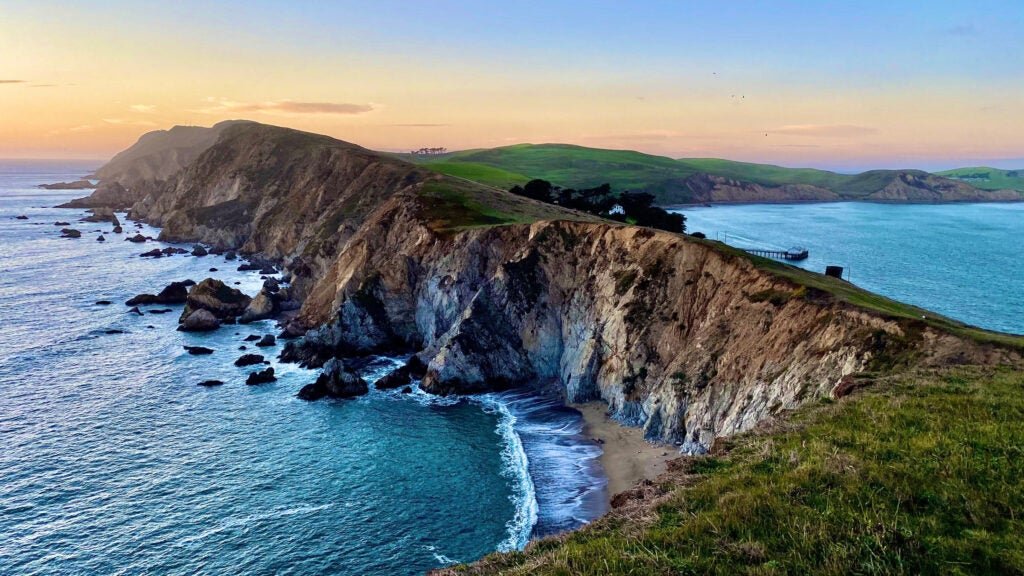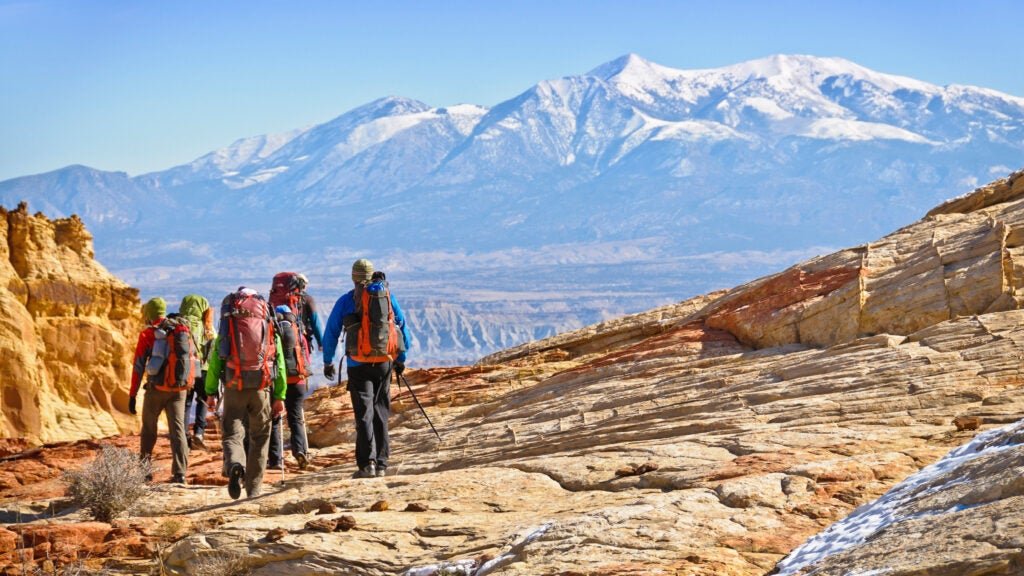Heading out the door? Learn this text on the brand new Outdoors+ app out there now on iOS units for members! Obtain the app.
Like many backpackers, hikers, path runners, and so forth, I typically go on adventures looking for a sure stillness. It’s quiet and nourishing. It’s what some would possibly name peace of thoughts, or happiness, or contentment. What I need throughout these moments is to be away from all that bothers and irritates and calls for my consideration and to be returned to myself. To place it in much less mystical tones, I wish to be off-grid, unplugged, with out know-how. Nothing shatters stillness fairly just like the ping of a cellphone.
I’ve spent a whole bunch of hours and maybe hundreds of {dollars} looking for stillness: meditation retreats in rural foothills throughout the nation, backpacking within the Sierras, tenting alongside the California coast. And I’ve turn out to be more and more uneasy concerning the untenability of this search.
It’s true that stillness is free. I couldn’t pay a greenback to get my palms on it. It’s a deep, internal pool that waits inside of every of us, reachable solely by way of time and effort, hours spent trudging up mountains and down canyons or fighting our personal insistent ideas whereas sitting on a tough cushion in a meditation corridor. On the similar time, the issues I do to achieve stillness price cash. Backpacking gear is dear, taking day without work from work is dear, and happening sufficient journeys to have the ability to benefit from the stillness of the backcountry can be costly. To waste a whole bunch of hours and to spend hundreds of {dollars} can require a number of privilege.
I needed to get away from all of the noise of questioning about privilege and exceptionalism, the parable of particular person meritocracy, and whether or not stillness actually is one thing that may solely be paid for or earned by way of particular person effort, and a heady exertion of will. The way in which to do that, I believed, was by heading into the peace and quiet of the backcountry, alone.
This spring, after an unusually moist winter with out a lot tenting, I deliberate a solo and phone-free backpacking journey to Level Reyes. I might make the brief and nice hike alongside the shore to Coast Camp, its nice eucalyptus sentinel untoppled by months of rain that had introduced down lesser giants. I might climb the ridgeline by way of bishop pine and douglas fir to the newly reopened Sky Camp; I might behold by way of fire-thinned forest the huge Pacific, Farralones bared to the southwest, the hulk of the headlands to the north. Away from not solely know-how, however the supply of know-how’s content material—individuals!—I might uncover a pinnacle of stillness.
Wildflowers dot the coast at Level Reyes Nationwide Seashore. (Photograph: YayaErnst / iStock / Getty Photos Plus by way of Getty Photos)
However as quickly as I began planning my journey, I noticed a few necessary issues.
I didn’t wish to do it. It was my accomplice’s spring break. She has a demanding job with an rigid schedule, and going backpacking alone throughout one in all her few breaks would have required me to chop into time we in any other case would have spent collectively. One other pal with whom I’ve shared many glad adventures additionally occurred to have days off from work that week. And lest I veer into dishonesty by the use of omission, I’m what may be known as, in technical phrases, a “scaredy cat.” A compulsive catastrophizer. A hazard ranger with full and oppressive jurisdiction over the entire lands and the entire seas. I’m the unique supervisor of a disaster call-center fielding calls which can be, additionally, solely from me—usually about whether or not the noise I’ve simply heard outdoors my tent is a mountain lion, a serial killer, or each.
Being afraid is, in reality, one of many issues I needed to put in writing about on my solo journey, together with the methods during which know-how does supply connection to individuals, to security, to rescue. I selected Level Reyes as the positioning for my would-be first foray into solo, technology-free backpacking exactly as a result of it’s, usually, full of individuals, and thus much less scary. And but, if I used to be going to put in writing concerning the pursuit of technology-free stillness, didn’t I must be alone? Shouldn’t I be prepared to pay the value of solitude?
My cellphone, although it doesn’t guarantee the protection of my physique, does enable me faster entry to the individuals I like. I don’t wish to draw back so shortly from this enmeshment, this love, this connection, and—sure—this security.
Our lives at present are completely saturated with know-how. In 2022, an app-monitoring agency discovered that folks internationally had been spending a median of 4.8 hours per day on cell apps. Research on digital dependancy and display time printed by the Nationwide Bureau of Financial Analysis and the Pew Analysis Heart reveal a scarcity of alternative on the subject of our telephones and the locations they take us: websites designed, typically explicitly, to tether us by the eyeballs to our screens. The impacts may be devastating to our psychological well being and wellbeing, and could also be tied to rising charges of despair and nervousness.
A cultural motion to show away from know-how is rising in response. Articles have a good time the return to flip telephones in elite personal colleges. New York Instances bestsellers and $675 workshops (authored by the identical individual that taught firms the best way to create addictive merchandise within the first place) encourage us to combat digital dependancy. Documentaries like The Social Dilemma invite the engineers answerable for constructing Instagram and Fb to debate precisely how these merchandise are sucking at our time and wellbeing, and the way particular person individuals can combat again.
For higher or worse, know-how has turn out to be integral to the trendy backpacking expertise. (Photograph: Jessie Casson / DigitalVision by way of Getty Photos)
Underlying this motion is a way of exceptionalism. People can select to disconnect from know-how and take away themselves from digital dependancy. We will improve our personal wellbeing by paying for a workshop, hiring a nanny as a substitute of plopping our youngsters down in entrance of an iPad, or—ahem—happening a meditation retreat, or backpacking, or tenting. However as journalist Johan Hari factors out in his guide, Stolen Focus, the issue of digital dependancy is a societal one. Options that concentrate on people are lacking the a lot bigger situation.
Entry to know-how was once the last word marker of privilege. Tech customers might boast each a surfeit of cash in addition to a advised surfeit of data, or no less than info. However more and more, the privilege is to be free from know-how. All it’s essential do to get away out of your cellphone is pay sufficient cash, or have sufficient willpower. With the ability to flip away from know-how has begun to replicate the identical abundance of alternative, time, and cash that having know-how used to.
As soon as I began to know these arguments, I began to comprehend why I actually didn’t wish to go on, or write about, a solo and technology-free backpacking journey. I’m a lady. I’m a small and homosexual and Black girl. I’m, in different phrases, a human product of destructible meat and bone. As talked about above, I’m additionally a scaredy cat that worries, maybe inordinately, about each worst-case-scenario. My cellphone, although it doesn’t guarantee the protection of my physique, does enable me faster entry to the individuals I like, who I do know fear about me and my physique’s security. I don’t wish to draw back so shortly from this enmeshment, this love, this connection, and—sure—this security.
A bobcat at Level Reyes (Photograph: Don Henderson / Second by way of Getty Photos)
I don’t wish to reinforce the argument that we are able to counter systemic issues—digital dependancy on the one hand, violence towards queer, femme, and Black individuals on the opposite—with particular person decisions. I don’t wish to reaffirm the idea that as a way to discover internal peace, calmness, or contentment I need to go away, go away my family members, be the solitary hero of my journey. As a result of to outlive and to thrive alone practically at all times means having to hold extra sources than if you weren’t alone. Carry one entire tent alone, or carry half a tent collectively.
Fixed connection by way of know-how does take a toll on our psychological, bodily, and social wellbeing. After I return from my tech-free experiences, I at all times really feel refreshed. However I additionally at all times return to a world that’s nonetheless stuffed with stressed, tech-addled, indignant individuals. Particular person retreats into technology-free wildernesses should not a panacea to a systemic drawback; they need to be reminders that psychological well being and wellbeing are in the end communal and collective wants, and neighborhood and collective duties. We want options that give individuals permission, whereas in neighborhood, to get off of our telephones and computer systems, to be glad and properly with out having to be aside from everybody else. Go tenting with your pals, and share your sources. Invite your mother and father on a hike. Speak to your child’s academics about limiting cellphone use, no less than throughout recess or different outside time. It’s simpler to look away out of your cellphone if there are different human faces to have a look at as a substitute.
In conclusion, I went to Level Reyes with my family members. We did deliver our telephones, however there was no cell service, and we discovered the connection we would have liked in one another, anyway. We walked alongside the coast; we beheld the eucalyptus; we slept, lulled by the night time calls of adolescent people on the bigger group website. We hiked to the highest of Mt. Wittenberg (FYI: there isn’t a view); we ate tinned oysters and sardines above the Pacific. At one level, we sat on the sand, nonetheless moist from rain, and watched the solar soften into the onrushing waves. Somebody (it was me) acquired their cellphone out to take a photograph, and never one in all us was the much less linked or quiet or glad or nonetheless for it; we had been in that high-quality mesh of contentment, that softly transferring container, holding us and holding all.
Stillness doesn’t require solitude, it doesn’t require disconnection, it doesn’t require particular person exceptionalism. It’s, in reality, the silencing of our anxieties and fears that permits us this most profound and human of revelations: We aren’t, we’re by no means, we’re in reality incapable of being alone. Stillness—that’s, happiness—can solely be shared. It’s within the sharing of ourselves with individuals, with animals, with land that it arises.



